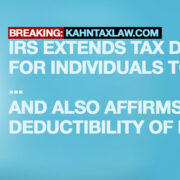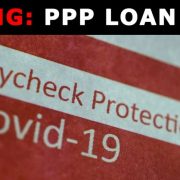More COVID-19 Tax Relief: IRS extends additional tax deadlines for individuals to May 17 and affirms deductibility of PPE
More COVID-19 Tax Relief: IRS extends additional tax deadlines for individuals to May 17 and affirms deductibility of PPE
The IRS announced that individuals have until May 17, 2021 to meet certain deadlines that would normally fall on April 15th, such as making IRA contributions and filing certain claims for refund. Additionally, the IRS announced that the purchase of personal protective equipment (PPE), such as masks, hand sanitizer and sanitizing wipes, for the primary purpose of preventing the spread of coronavirus are deductible medical expenses.
This follows a previous announcement from the IRS on March 17, 2021, that the federal income tax filing due date for individuals for the 2020 tax year was extended from April 15, 2021, to May 17, 2021. Notice 2021-21 provides details on the additional tax deadlines which have been postponed until May 17th.
Time to make contributions to IRAs and health savings accounts extended to May 17th
In extending the deadline to file Form 1040 series returns to May 17th, the IRS is automatically postponing to the same date the time for individuals to make 2020 contributions to their individual retirement arrangements (IRAs and Roth IRAs), health savings accounts (HSAs), Archer Medical Savings Accounts (Archer MSAs), and Coverdell education savings accounts (Coverdell ESAs). This postponement also automatically postpones to May 17, 2021, the time for reporting and payment of the 10% additional tax on amounts includible in gross income from 2020 distributions from IRAs or workplace-based retirement plans. The IRS is also postponing the due date for Form 5498 series returns related to these accounts to June 30, 2021.
2017 unclaimed refunds – deadline extended to May 17th
For tax year 2017 Federal income tax returns, the normal April 15th deadline to claim a refund has also been extended to May 17, 2021. The law provides a three-year window of opportunity to claim a refund. If taxpayers do not file a return within three years, the money becomes property of the U.S. Treasury. The law requires taxpayers to properly address, mail and ensure the tax return is postmarked by the May 17, 2021, date.
Additionally, foreign trusts and estates with federal income tax filing or payment obligations, who file Form 1040-NR, now have until May 17, 2021.
2021 AFSP deadline postponed to May 17th
Tax preparers interested in voluntarily participating in the Annual Filing Season Program (AFSP) for calendar-year 2021 now have until May 17, 2021 to file their application with the Internal Revenue Service. The normal due date is April 15th.
First Quarter 2021 estimated tax payment remains due April 15th
IRS’ announcement does not alter the April 15, 2021 deadline for estimated tax payments. These payments are still due on April 15th. Taxes must be paid as taxpayers earn or receive income during the year, either through withholding or estimated tax payments. In general, estimated tax payments are made quarterly to the IRS by people whose income isn’t subject to income tax withholding, including self-employment income, interest, dividends, alimony or rental income. Most taxpayers automatically have their taxes withheld from their paychecks and submitted to the IRS by their employer.
Deductibility of PPE
Expenses for masks, hand sanitizers, sanitizing wipes and other personal protective equipment (PPE) used primarily to prevent the spread of COVID-19 will be treated as amounts paid for medical care under Internal Revenue Code (IRC) §213(d). These expenses are included in Medical Expenses on Schedule A, Itemized Deductions, and the amount in excess of 7.5% of your Adjusted Gross Income is deductible.
Alternatively, the amounts paid for PPE are also eligible to be paid or reimbursed under health flexible spending arrangements (health FSAs), Archer medical savings accounts (Archer MSAs), health reimbursement arrangements (HRAs), or health savings accounts (HSAs).
An Opportunity For Taxpayers Who Owe The IRS
As a prerequisite to any proposal to the IRS, you must be in current compliance. That means if you have any outstanding income tax returns, they must be completed and submitted to IRS.
Also, if you are required to make estimated tax payments, you must be current in making those payments. Fortunately, as we are now in 2021, taxpayers who expect to owe for 2020 should have their 2020 income tax returns done now so that the 2020 liability can be rolled over into any proposal and the requirement to make estimated tax payments will now start for 2021.
Remember that COVID-19 does not alter the tax laws, so all taxpayers should continue to meet their tax obligations as normal. Individuals and businesses should keep filing their tax returns and making payments and deposits with the IRS, as they are required to do.
The take away from this – use the Federal government’s extension to your advantage to prepare for the future.
What Should You Do?
You know that at the Law Offices Of Jeffrey B. Kahn, P.C. we are always thinking of ways that our clients can save on taxes. If you are selected for an audit, stand up to the IRS by getting representation. Tax problems are usually a serious matter and must be handled appropriately so it’s important to that you’ve hired the best lawyer for your particular situation. The tax attorneys at the Law Offices Of Jeffrey B. Kahn, P.C. located in Orange County (Irvine), Northern California (Sacramento and San Francisco Bay Area) and elsewhere in California are highly skilled in handling tax matters and can effectively represent at all levels with the IRS and State Tax Agencies including criminal tax investigations and attempted prosecutions, undisclosed foreign bank accounts and other foreign assets, and unreported foreign income. Also if you are involved in cannabis, check out what a cannabis tax attorney can do for you. And if you are involved in crypto currency, check out what a bitcoin tax attorney can do for you.



 Follow
Follow Follow
Follow